A thick, shinier, soft beard takes a lot of nourishment and patience. For most men, it adds confidence and masculinity to their overall persona.
It is a challenging task to find the right oil that can promote beard growth, prevent itching, dandruff, and much more at the same time.
Hundreds of brands make beard oil, balms, and serums for the same. They blend carrier or natural oils with essential oils to combat beard problems.
I am not saying those brands are overhyped. Some people get benefits from them also. It depends on whether you want to go natural or with those brands.
Thankfully nature has given us the best natural oils for beard growth that we can use as an alternative to those branded products.
Here, we will explore the best natural oils for beard growth and how to use them effectively to unlock your beard’s full potential.
Table of Contents
How does Natural oil promote beard growth?
Natural oils are extracted from plants and are rich in vitamins, minerals, and fatty acids.

It helps to nourish hair follicles, moisturize hair and repair the damaged, dry skin underneath. Beard oils may contain some extra chemicals which may or may not suit you.
But natural oils are free from chemicals, and toxins, ensuring a gentle and nurturing experience for your beard. Mostly, they are suited to every skin type.
Here are some other factors through which natural oils promote beard growth:
Nourishing the Hair Follicles
Natural oils applied to the beard absorbs instantly into the skin and provide essential nutrients to the hair follicles that promote healthy beard growth.
The carrier oil helps to strengthen the roots to the tips of the beard without making it greasy. It prevents hair breakage and excess drying and rejuvenates new hair growth.
Stimulating Blood Circulation in the Beard Area
Natural oils for beard growth help to improve blood circulation in that area means better nutrient delivery to the hair follicles and healthy growth.
All you have to do is regularly massage the natural oil instead of any beard care product. It will improve skin moisture and enhance growth.
Reducing Hair Breakage and Split Ends
Environmental changes, heating tools, and wrong chemical-based products can strip away your natural beard oil resulting in dry, brittle hair with split ends and breakage.
Natural oil for beard growth is one of the best moisturizers that act as a protective barrier. It seals moisture and prevents breakage and dryness.
It helps to keep the natural beard oil intact and maintain the length and fullness of your beard.
Reducing Beard Itch and Irritation:
Dry, itchy, irritated beards are common in your beard care journey.
The skin and beard become itchy due to weather changes, heating tools, beard care products, or negligence.
Natural oils have soothing characteristics that relieve itching and irritation on the skin.
Softening and Taming Beard Hair:
Natural oils are the best alternative to beard oils and balms. It helps to moisturize, nourish hair follicles, and make a coarse beard soft, manageable, and easier to groom.
While natural oils certainly aid in beard development, it is crucial to erase the idea of quick results. Beard growth is a slow and steady process influenced by genetics, age, and overall health. Consistent usage of natural oils can result in a fuller and healthier beard over time, but expecting immediate benefits may leave you disappointed.
What to look for in natural oils?
When searching for natural oils for beard growth, you must consider several factors to get high-quality carrier oils that can positively impact your beard.
Here are some crucial things to look for:
Purity and Source:
Choose natural oils labeled “100% pure” or “100% natural.”
Also, check the back label of the natural oils. They must have no additives or synthetic components.
The easiest way to find pure natural oils is to go with reputable brands that clearly state the oil’s botanical name and country of origin.
Extraction Method:
The extraction method of any natural oil for beard growth plays a vital role.
Methods like steam distillation and cold pressing are the best extraction techniques that do not alter the plants’ properties.
Look for natural oils with these extraction processes for better results.
Botanical Name:
Before purchasing the natural oil, make sure you know the botanical name of that oil and match it with the label.
It is crucial to check that you are purchasing the correct oil, as some plants may have numerous varieties with differing qualities.
Scent and Color:
Natural oils should have a distinct aroma and color connected with the plant from which they are derived. Be aware of oils with a strong chemical odor that appears unnaturally colored.
Packaging:
Oils are light and heat sensitive, which can deteriorate their quality over time. Look for oils in dark glass bottles with airtight caps to preserve them from sunlight.
Certifications:
Some oils may be certified organic, non-GMO, or cruelty-free. While these labels aren’t required, they might provide additional assurance regarding the quality of the goods.
Reputation and Reviews:
Research the brand and read customer feedback to determine the oil’s effectiveness and purity.
Uses and Recommendations:
Different oils have different medicinal characteristics and applications. Ensure the oil you purchase is appropriate for your use, whether for aromatherapy, skincare, massage, or anything else.
Price:
High-quality natural oils might be more expensive because of the lengthy process involved in the making.
While price alone shouldn’t determine the quality, exceptionally low-cost oils may raise questions about their authenticity and purity.
Remember that natural oils have various effects on different people, so do a patch test before using them frequently, especially if you have sensitive skin or allergies. In case of any doubt, always follow the directions and seek a qualified aromatherapist or healthcare expert.
11 best natural oils for beard growth
Coconut oil
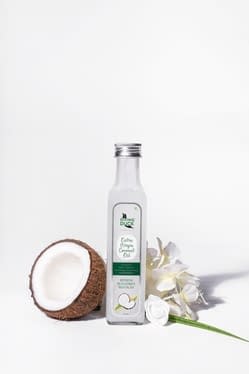
Coconut oil has always been the most versatile remedy for medicinal use, moisturizing skin, hair, and beards.
It has a high moisture retention capacity, which means it retains moisture and avoids dryness, frizz, and split ends.
Coconut oil has lauric acid, which has anti-microbial properties that help to soothe the skin, reducing itchiness and inflammation commonly associated with beard growth.
The best part is it contains a good ratio of vitamins and fatty acids that hydrates the beard, nourish hair follicles, and promotes thicker growth.
Jojoba oil
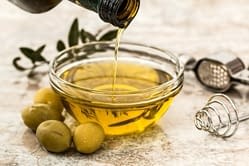
Jojoba oil for beard growth is another choice for the best natural oils for a beard due to its beneficial properties.
Jojoba oil is rich in fatty acids like oleic acid, eicosenoic acid, erucic acid, and vitamin e that contribute to its moisturizing, nourishing, and protective properties.
It resembles the consistency of our natural skin oil, which helps in better absorption and moisturization of the beard and the skin underneath with non-greasiness.
The hydrating effect of jojoba oil not only combat dryness, dandruff, and itching but it creates a better environment for beard growth.
Castor oil

Castor oil is one of the most popular natural oil for beard growth, hair, and skin. It may have a thicker consistency than others, but its diluted version is equally effective.
It has ricinoleic acid, a unique fatty acid with anti-inflammatory properties that helps improve blood circulation to the hair follicles and stimulates healthy beard growth.
It also contains vitamin E that nourishes hair follicles, hair strands, and the skin underneath.
Also, it helps to combat itchiness, dryness and keep the skin moisturized for long.
Sweet Almond oil
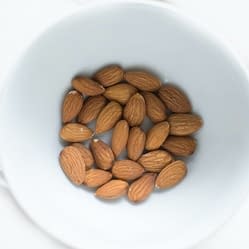
Sweet almond oil is another best natural oil for beard growth. It is rich in vitamin B complex, vitamin E, essential fatty acids, and more.
The nutritional properties of sweet almond oil for the beard help to prevent dryness, breakage, and split ends.
Regular massaging of sweet almond oil stimulates better blood circulation, which means higher nutrition transfer, which improves beard development and appearance.
In addition to nourishing the beard and the skin, it reduces irritation, itching, and dryness.
Argan oil
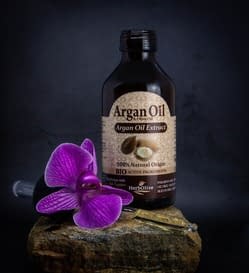
Argan oil is another choice for the best natural oil for beard growth. It contains all the nutrients required for thorough conditioning and combating beard problems.
It has essential fatty acids, antioxidants, and vitamins that nourish hair follicles and the skin underneath.
In addition, it helps to prevent dryness, frizz, and brittleness, promoting softer and more manageable beard hair.
The antioxidants in argan oil prevent hair damage caused by free radicals, maintaining healthier-looking facial hair.
Also, massaging argan oil into the beard area can improve blood circulation, potentially stimulating beard growth.
Rosehip oil
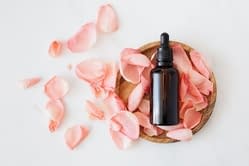
Rosehip oil for beard is a wise choice to support beard growth and improve beard health.
It has nutrients like essential fatty acids, vitamins, and antioxidants that help to nourish facial hair and the skin from within.
Rosehip oil contains vitamins A and C that encourage collagen formation, which can result in healthier and thicker beard hair.
Also, it prevents dryness and itching by moisturizing and hydrating the beard, and its antioxidant capabilities protect the beard from free radical damage.
Sunflower oil

Sunflower oil is a versatile natural oil that can aid in the growth and health of your beard.
It contains crucial vitamins such as vitamin E, which nourishes and moisturizes facial hair, reducing dryness and promoting softer, more manageable beard strands.
The lightweight texture of the oil makes it simple to apply without leaving a greasy residue.
Sunflower oil also has antioxidant capabilities, which preserve the beard from environmental damage and breakage.
Avocado oil
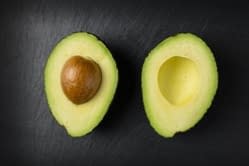
Avocado oil is a healthy oil that can boost beard growth and improve overall beard health.
It contains vitamin E, which nourishes and moisturises facial hair, preventing dryness and reducing breakage.
Avocado oil contains vital fatty acids and helps to strengthen and condition the beard, making it softer and more manageable.
Furthermore, avocado oil’s capacity to fully permeate the hair shaft can help to increase moisture and beard texture.
Vitamin E oil

Vitamin E oil is helpful with beard growth and overall beard health.
Its potent antioxidant qualities protect hair follicles from oxidative stress and free radical damage, resulting in a healthy environment for beard growth.
Vitamin E oil is highly moisturizing and can help to avoid dryness and itching in the beard.
Also, it may help to make beard hair stronger, softer, and more manageable by feeding the hair and the skin beneath it.
Incorporating vitamin E oil into your beard care routine daily can improve the appearance and condition of your beard.
Apricot kernel oil

Apricot kernel oil is a natural oil obtained from apricot kernels (seeds). It is well-known for its potential advantages in beard maintenance.
Apricot kernel oil, high in vital fatty acids, vitamins A and E, and other nutrients, nourishes the facial hair and the underlying skin.
Its non-greasy, lightweight texture makes it an excellent moisturizer, avoiding dryness and fostering softer, more manageable beard hair.
The emollient elements in the oil also help to soothe and calm the skin, decreasing beard itching and irritation.
Incorporating apricot kernel oil in your beard care routine will help your facial hair look healthier and more glossy.
Grapeseed oil

Grapeseed oil is a popular natural oil that may help with beard growth and overall wellness.
It’s a lightweight oil with essential fatty acids, antioxidants, and vitamins, including vitamin E.
The moisturizing characteristics of grapeseed oil assist in hydrating facial hair, decreasing dryness, and lowering the risk of breakage.
Its antioxidant component protects the beard from free radicals and environmental damage. The non-greasy nature of the oil makes it simple to apply and leaves the beard that appears well-groomed.
Why natural oils over branded beard oils?
I am not saying that all branded beard oils have nothing to offer. I have reviewed many best-unscented beard oils that have immense benefits.
You can try natural oils for beard growth as they are accessible, affordable, and suited to most skin types. There are some more benefits you may not know:
No Synthetic Additives:
Natural oils are 100% pure and free from synthetic additives, chemicals, fragrances, and preservatives.
Branded beard oils contain various essential oils, carrier oils, and chemicals that can irritate the skin or cause allergic reactions.
Chemical-Free:
Natural oils do not contain harmful chemicals like parabens, sulfates, or phthalates that may be present in some branded products.
Natural oils reduce the risk of exposing your skin and facial hair to potentially harmful substances.
Rich in Nutrients:
Natural oils, such as coconut, jojoba, almond, and argan oil, contain criucial nutrients like vitamins, minerals, and fatty acids, which nourish and moisturise the beard and skin.
These nutrients promote healthier beard growth and improved beard texture.
Versatility:
Natural oils can serve multiple purposes beyond beard care.
Many can be used as facial moisturizers, skin conditioners, or even for hair care, making them more versatile and cost-effective.
Cost-Effective:
Branded beard oils often include marketing and packaging costs, making them pricier than pure natural oils, which are relatively more affordable.
Customization:
With natural oils, you can mix and match different oils to create your personalized beard oil blend tailored to your specific needs and preferences.
However, it’s important to note that not all branded beard oils are ineffective or chemical-based. Some reputable brands offer high-quality, natural-based products.
Beard oil recipes using natural oils
Here are two simple beard oil recipes using natural oils:
Nourishing Beard Oil:
- 1 oz (30 ml) Jojoba Oil
- 1 oz (30 ml) Argan Oil
- 5-10 drops of Cedarwood Essential Oil (for a pleasant woodsy scent)
Combine all the ingredients in a glass bottle or dropper bottle. Shake well before use. Apply a few drops to your palms, rub them together, and massage the oil into your beard and skin.
Citrus Beard Oil:
- 1 oz (30 ml) Sweet Almond Oil
- 1 oz (30 ml) Grapeseed Oil
- 5-7 drops of Lime Essential Oil
- 3-5 drops of Bergamot Essential Oil
Combine the carrier oils in a bottle, and then add the essential oils. Mix well. Gently massage a little bit into your beard.
Remember to perform a patch test before using any new essential oil to ensure you don’t have any allergic reactions. Enjoy your DIY beard oils!
How to apply carrier oil on a beard?
Applying natural oil to your beard is a simple technique. Follow these steps for application:
Cleanse Your Beard:
Cleanse your skin with a mild beard soap or shampoo to eliminate dirt, debris, or product buildup. Pat dry your skin with a towel.
Prepare the Oil:
You can either take a single carrier oil for your beard or blend it with others to make DIY beard oil.
Mix all the ingredients before using and do a patch test.
Warm the Oil:
Pour a few drops of natural oil on your palm and rub the oil to warm it up. Warm oil spreads and absorb better in the skin and beard.
Apply to Your Beard:
Massage the oil into your beard from the tips to the roots. Ensure even distribution of the oil, making sure it reaches the skin underneath the beard.
Use a Beard Comb or Brush:
After applying the oil, use a beard comb or brush and evenly distribute the oil throughout your beard. It will also help detangle the beard and keep it looking neat.
Style as Desired:
You can now shape and style your beard using a beard balm or wax.
Conclusion
Using natural oil for beard growth is one of the wisest decisions, especially when you have sensitive skin or want natural and affordable option for beard care.
You can use thicker options like castor oil or non-greasy options like jojoba, argan, or sweet almond. It is up to you.
I recommend blending various natural oils with essential oils to enhance their effectiveness.
FAQs:
What are the best natural oils for stimulating beard growth?
The best natural oils for stimulating beard growth are jojoba, argan, sweet almond, coconut, and castor oil.
How often should I apply natural oils to my beard?
You can apply natural oil twice a day. Make sure you have cleansed your face before applying any oil to your face.
Can natural oils help with patchy beard growth?
Yes, natural oil can help to prevent beard patchiness by improving blood flow and combating dryness, itching, and other beard-related issues. However, beard growth depends on many factors like genes, lifestyle, hormones, stress level, and sleep, so do not rely only on natural oil.
Are there any side effects of using natural oils on my beard?
Yes, natural oils are the purest oils present on earth. Still, you may get allergies through it. You may suffer redness, pimples, irritation, or itching after applying some of them, especially when you are allergic to that oil or have not aligned your skin and natural oil needs.
How long does it take to see results from using natural oils for beard growth?
It depends on the purpose, skin type, and the natural oil. If you want to prevent dryness, itching, breakage, or split ends, it may take up to 4-5 weeks. However, for other beard-related concerns such as dandruff and acne, you should contact a doctor in addition to expecting treatment from the natural oil.
Kayden is an entrepreneur, writer, hairstylist working in a professional salon. He specializes in men’s grooming. He loves to blog about beards, hairstyles, and skincare.
